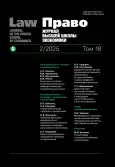On the Legal Nature of the «Revenue Prescription»
- 作者: Kabytov P.1, Sinitsyn S.1
-
隶属关系:
- Institute of Legislation and Comparative Law under the Government of the Russian Federation
- 期: 卷 18, 编号 2 (2025)
- 页面: 59-86
- 栏目: Russian Law: Condition, Perspectives, Commentaries
- URL: https://journal-vniispk.ru/2072-8166/article/view/317612
- DOI: https://doi.org/10.17323/2072-8166.2025.2.59.86
- ID: 317612
如何引用文章
全文:
详细
作者简介
P. Kabytov
Institute of Legislation and Comparative Law under the Government of the Russian Federation
Email: kapavel.v@yandex.ru
ORCID iD: 0000-0001-8656-5317
S. Sinitsyn
Institute of Legislation and Comparative Law under the Government of the Russian Federation
Email: synss@mail.ru
ORCID iD: 0000-0002-1148-4552
参考
- Alekseev S.S. (1981) General theory of law. Vol. I. Moscow: Juridicheskaya literatura, 355 p. (in Russ.)
- Bakhrah D.N. (2000) Administrative law of Russia: textbook. Moscow: Norma, 623 p. (in Russ.)
- Bakhrah D.N. (1969) Soviet legislation on administrative liability: textbook. Perm: University, 344 p. (in Russ.)
- Bashlakov-Nikolaev I.V. (2015) Enforcement in the field of competition protection. Finansovoe pravo i upravlenie=Financial Law and Management, no. 3, pp. 306–318 (in Russ.)
- Egorova M.A. (2019) Compensation for losses caused by violations of antimonopoly legislation. Jurist=Lawyer, no. 4, pp. 4–5 (in Russ.)
- Gagarina I.V. (2018) Transfer to federal budget of income received from fines for monopolistic activities or unfair competition. Biznes, management i pravo=Business, Management and Law, no. 4, pp. 48–55 (in Russ.)
- Kaplunov A.I. (2005) Administrative coercion applied by internal affairs bodies (system analysis). Doctor of Juridical Sciences Thesis. Moscow, 498 p. (in Russ.)
- Klein N.I. (2008) Protection of public law and order and civil rights in violation of antimonopoly legislation. Zakon=Law, no. 2, pp. 31–36 (in Russ.)
- Kononov P.I. (2023) Issues of administrative law: textbook. Moscow: Knorus, 314 p. (in Russ.)
- Kudryavtsev V.N. (1986) Law, deed, responsibility. Moscow: Norma, 448 p. (in Russ.)
- Lapina M.A., Karpukhin D.V., Kurakin A.V. (2017) Application of administrative coercion for violation of legislation on protection of competition. Sovremennoye pravo=Modern Law, no. 12, pp. 42–49 (in Russ.)
- Leist O.E. (1962) Sanctions in the Soviet law. Moscow: Yuridicheskaya literatura, 238 p. (in Russ.)
- Makareiko N.V. (1996) State coercion as a means of maintaining public order. Candidate of Juridical Sciences Thesis. Nizhny Novgorod, 249 p. (in Russ.)
- Pisenko K.A. (2010) Theoretical aspects of using a measure of recovery to the budget of illegally obtained income in the system of state antimonopoly control in the Russian Federation. Vestnik rossiyskogo universiteta druzhby narodov. Pravo=Bulletin of the Peoples’ Friendship University of Russia. Law, no. 4, pp. 35–48 (in Russ.)
- Pisenko K.A., Tsindeliani I.A., Badmaev B.G. (2010) Legal regulation of competition and monopoly in the Russian Federation: course of lectures. Moscow: Statut, 411 p. (in Russ.)
- Ryzhenkov A.Ya. (2017) Law and monopolies in modern Russia. Moscow: Yustitzinform, 206 p. (in Russ.)
- Seregina V.V. (1991) State coercion under the Soviet law. Voronezh: University, 117 p. (in Russ.)
- Starilov Yu.N. et al. (2010) Ivan Alexandrovich Galagan and his scholar legacy. Voronezh: University, 542 p. (in Russ.)
- Totyev K.Y. (2010) Antimonopoly authority’s order on transfer of illegal income: legal nature and functions. Zakony Rossii: Laws of Russia, no. 8, pp. 40–48 (in Russ.)
补充文件








